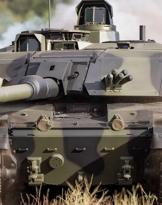Russia will continue to provide military equipment to enhance the defense capabilities of the Syrian regular army. This was stated a few minutes ago by Russian Foreign Minister Sergei Lavrov. Therefore, what we hypothesized a few hours ago has been confirmed.
The seven cargo planes that landed at the al-Assad International Airport, south of Latakia and the two landing ships that arrived at the Tartus base, represent only the beginning of a possible Russian deployment. If it is true, in fact, that on the one hand the Russians continue to affirm that the intervention in Syria is logistic (by virtue of compliance with the contracts already signed), on the other it is clear that in addition to the technicians, Moscow will send a fighting force for protect your men.
Dozens of Russian BTR-82A armored vehicles landed on the Syrian coasts and may already be in battle against ISIS, while the latest satellite images confirm the average of cargo flights landing at Latakia, estimated at four per day. Increased activity in the two war fleets that the Russians have in the Region. Right from the sea, the Russians (considering the number of units in the area) can send a powerful amphibious landing force, in much faster times than the American counterpart.
"I can say once again that our military is there to maintain Russian equipment and educate the Syrian army. We will continue to provide logistical support to the Syrian government and provide them with the defense capability needed to address the terrorist threat." The minister stressed that Russia is not supporting Syrian President Bashar Assad, but rather "the struggle in Damascus against the Islamic State". He also urged the countries of the international coalition to cooperate with the Syrian army against the extremist matrix group Islamic.
 He added (strategically) Lavrov, echoing what was declared yesterday by the Kremlin spokesman Dmitry Peskov. "It is necessary, of course, to interact with the land forces. The only efficient and powerful land force against the Islamic State is the Syrian army. Coordination is necessary to avoid accidents."
He added (strategically) Lavrov, echoing what was declared yesterday by the Kremlin spokesman Dmitry Peskov. "It is necessary, of course, to interact with the land forces. The only efficient and powerful land force against the Islamic State is the Syrian army. Coordination is necessary to avoid accidents."
Since 2011, forces loyal to Assad have been fighting against various opposition groups, some of them radical extremists like the Front al-Nusra Front and the Islamic State. Since the start of the civil war in Syria, the United States has supported the moderate Syrian opposition, demanding Assad's resignation. Russia, on the other hand, recognized Assad as the only legitimate authority of Syria.
Paradoxically, what is happening in Syria could have repercussions in Ukraine and Bulgaria. Both countries, in fact, denied the right of transit through their respective airspace for all Russian aircraft bound for Syria. Ukraine, according to the Russians, is now a pawn of the United Stari.
Kiev closed the airspace under pressure from the United States - declared Leonid Slutsky president of the Duma commission for CIS affairs, Eurasian integration and relations with compatriots abroad - therefore not helping us, they are accomplices of the Islamic State. The closure of Ukrainian airspace will not become an obstacle, we will find a way around it, as happened with Bulgaria.
The US would also be lobbying to ban Greek airspace. Iran, on the other hand, has authorized its own airspace for all Russian aircraft bound for Syria. It should be noted that the Russians, in Syria, have a real prefabricated field, capable of hosting over a thousand soldiers.
 In reality, relations between Syria and Russia, in the last 60 years, have never changed. Moscow has always supplied weapons, consultants and military equipment. Between the 2009 and the 2011 Russia guaranteed 71 per cent of all Syrian military supplies, most of them dedicated to air defense systems. And it could be even easier, finally, to predict what might happen in the next few hours. Because the Russians know perfectly well that they are going to war. After massing troops and heavy vehicles, Moscow could decide to send heavy helicopters and transport helicopters.
In reality, relations between Syria and Russia, in the last 60 years, have never changed. Moscow has always supplied weapons, consultants and military equipment. Between the 2009 and the 2011 Russia guaranteed 71 per cent of all Syrian military supplies, most of them dedicated to air defense systems. And it could be even easier, finally, to predict what might happen in the next few hours. Because the Russians know perfectly well that they are going to war. After massing troops and heavy vehicles, Moscow could decide to send heavy helicopters and transport helicopters.
The Russian intervention, after the activation of a land-air defense line (certainly not designed for ISIS), will culminate with the dispatch of a CAS combat air force. From that moment on, the Russians could go to war against the Islamic State at any time in defense of allied interests. And Damascus, as we know, has much more than an enemy.
Finally, to date Moscow has confirmed the absence of fighting troops in Syria: translated means that Russian shadow departments could already be in action (for weeks).
(photo: MoD Fed Russian / SANA archive)












